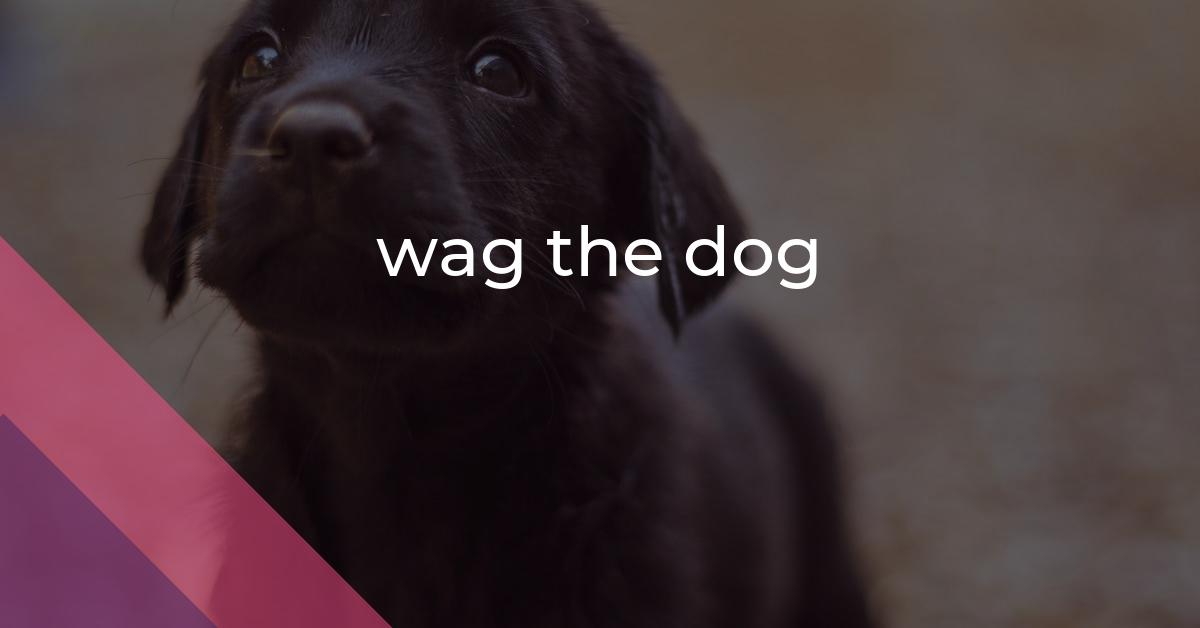wag the dog: Idiom Meaning and Origin
What does ‘wag the dog’ mean?
Wag the dog: An idiom which means to divert attention from a major issue by focusing on a minor or less significant issue instead.

Idiom Explorer
The idiom "wolf in sheep's clothing" refers to someone who appears to be harmless or gentle, but is actually dangerous or malicious.
The idiom "wild-goose chase" refers to a fruitless or pointless pursuit or search that is unlikely to be successful. It implies a wasted effort and a sense of futility.
The idiom "whistle in the wind" means to make an attempt or statement that has no result or impact, as the sound of a whistle is often carried away and lost in the wind.
The idiom "whistle for" means to expect or hope for something that is unlikely to happen or is not forthcoming.
The idiom "whisk away" means to quickly and unexpectedly take someone or something away from a place or situation.
The idiom "while we're young" means to do something quickly or without delay, often with a sense of urgency or impatience.
The idiom "which way the wind is blowing" means to be aware of current trends or popular opinions in order to adapt or make decisions accordingly.
The idiom "weasel out" means to avoid or escape from a situation, often through deceitful or cunning behavior.
The idiom "wave of the hand" means to dismiss or reject something or someone casually or without any concern or effort. It suggests a nonchalant or careless attitude towards the subject at hand.
Unveiling Canine Manipulation
One commonly used idiom in American English is "wag the dog." This idiom originates from a longer expression: "the tail wagging the dog." Here are the facts known about the idiom:
The phrase "wag the dog" means to divert attention from something significant by focusing on something less important. The idiom gained popularity after the release of the 1997 political satire film titled "Wag the Dog." It is believed that the phrase was derived from the idiom "the tail wagging the dog," which signifies a situation where a small or insignificant part controls the larger whole. This idiom became widely used in political contexts, illustrating the manipulation of public perception and media narratives. The origins of the idiom can be traced back to various examples in literature and journalism preceding the film's release.
The idiom is often used to describe instances where a government or other influential entity creates a distraction or false narrative to divert attention from issues or scandals. It can also be used to suggest that something is being fabricated or manipulated for ulterior motives.
The idiom "wag the dog" has become ingrained in the American lexicon, particularly in the realm of politics and media. It serves as a vivid metaphor depicting the manipulation of public opinion and the creation of distractions. The origins of the phrase can be traced back to the broader expression "the tail wagging the dog," which symbolizes a situation where a minor aspect controls or influences a larger entity. However, the idiom gained significant popularity after the release of the film "Wag the Dog." This satirical depiction of the political world further reinforced the idiom's relevance and expanded its usage.
The phrase "wag the dog" often finds its place in discussions of political strategy, media manipulation, and public perception. It encapsulates the notion that those in power can divert attention from significant issues by focusing on less important matters. This intentional distraction and fabrication can be seen as a tactic to mold public opinion or evade scrutiny. Through the idiom, a nuanced critique of power dynamics emerges, questioning the authenticity and motives behind political actions.
One cannot overlook the idiom's versatility in conveying suspicion and skepticism. By suggesting that something is being manufactured or manipulated, "wag the dog" highlights how individuals and institutions can manipulate narratives and shape public discourse to their advantage. The idiom's usage extends beyond politics, reaching domains such as media, advertising, and even interpersonal relationships.
While the specific origins of the idiom "wag the dog" remain elusive, it is evident that its significance has transcended its initial context. As an observer of language and idiom usage, one cannot help but marvel at the creative and powerful nature of this expression. From politics to everyday life, "wag the dog" embodies the interconnectedness between language, power, and perception, leaving room for further exploration and interpretation.
Example usage
Examples of how the idiom "wag the dog" can be used in a sentence: 1. The politician's scandal was an attempt to wag the dog, diverting attention away from his failed policies. 2. The company's announcement of a new product launch was just a way to wag the dog and distract from their declining sales. 3. The celebrity's social media feud seemed to be an attempt to wag the dog and keep her in the public eye despite her dwindling fame.
These examples demonstrate the use of the idiom "wag the dog" to refer to situations where someone deliberately creates a diversion or distracts others from a more important or damaging issue. In each sentence, the idiom is used metaphorically to describe an intentional act aimed at deflecting attention or manipulating public perception.
More "Manipulation" idioms



